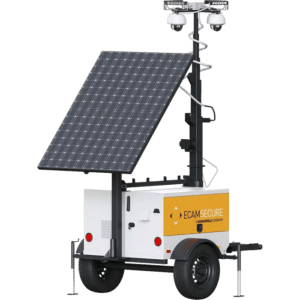| Contact us if you are a camera manufacturer / supplier or a property manager / construction company and you have questions about remote power for MST’s |

What is a Mobile Security/Surveillance Trailer (MST)?
A mobile surveillance trailer is a self-contained unit designed to provide a secure and mobile platform for surveillance operations. These trailers are equipped with high-tech surveillance equipment, including cameras, sensors, and communication systems, allowing for real-time monitoring and recording of activities. They are commonly used in various applications, such as:
- Public safety: Monitoring public areas, events, and traffic
- Private security: Protecting businesses, properties, and critical infrastructure
- Law enforcement: Investigating crimes and gathering evidence
- Border control: Securing borders and detecting illegal activities
Key Components of a Mobile Surveillance Trailer
A typical mobile surveillance trailer includes the following components:
- Surveillance equipment: Cameras, sensors, microphones, and other devices used to gather information
- Communication systems: Radios, antennas, and internet connectivity for transmitting and receiving data
- Power supply: Generators, batteries, or solar panels to provide electricity for the equipment
- Security features: Alarms, locks, and reinforced construction to protect the trailer and its contents
The Rise of Solar Powered Mobile Security/Surveillance Trailers (MST’s)
In recent years, there has been a growing trend toward using solar power to operate mobile surveillance trailers. Solar energy offers several advantages, including:
- Reduced operating costs: Eliminates the need for fuel or generator maintenance
- Environmental benefits: Reduces carbon emissions and promotes sustainability
- Increased autonomy: Allows for operation in remote or off-grid locations
However, choosing the right solar power system for a mobile surveillance trailer can be challenging. Factors to consider include:
- Trailer size and power requirements: The size of the trailer and the amount of equipment it houses will determine the necessary solar panel capacity.
- Location and climate: The amount of sunlight available in the trailer’s operating location will affect the solar system’s performance.
- Battery storage: Sufficient battery capacity is needed to store energy for nighttime or cloudy conditions.
- Installation and maintenance: Proper installation and regular maintenance are essential for optimal solar system performance.
Diesel Generator vs. Fuel Cells to Back Up Solar Power
While solar power is becoming increasingly popular, traditional power sources like generators and fuel cells are still widely used as a backup power source for mobile surveillance trailers. Here’s a comparison between these two backup power options:
| Power Option: | Generator | Fuel Cell |
| Power output: | High | Medium |
| Fuel source: | Diesel, gasoline | Hydrogen |
| Noise level: | High | Low |
| Emissions: | Moderate | Low |
| Maintenance: | Regular | Special |
| Cost: | Lower upfront cost, higher operating costs | Higher upfront cost, lower operating costs |
Choosing the Right Trailer
When selecting a mobile surveillance trailer, it’s important to consider the following factors:
- Purpose: Determine the specific needs and requirements of the surveillance operation.
- Size and capacity: Choose a trailer that can accommodate the necessary equipment and personnel.
- Features and technology: Evaluate the available features, such as camera resolution, sensor types, and communication capabilities.
- Power source: Decide on the most suitable power source based on the trailer’s operating environment and budget.
- Security and durability: Ensure the trailer is equipped with adequate security measures and is built to withstand harsh conditions.
By carefully considering these factors, you can select a mobile surveillance trailer that meets your specific needs and provides reliable and effective surveillance capabilities.
